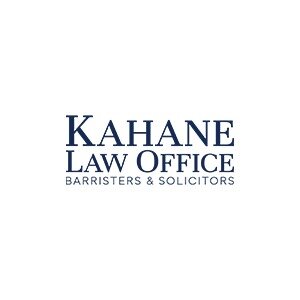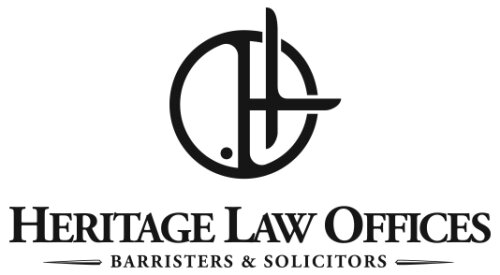Best Mining Law Lawyers in Edmonton
Share your needs with us, get contacted by law firms.
Free. Takes 2 min.
List of the best lawyers in Edmonton, Canada
About Mining Law in Edmonton, Canada
Mining Law in Edmonton, Alberta, is a specialized area of legal practice that covers the exploration, extraction, processing, and reclamation of minerals and mining operations within the region. Mining activities in and around Edmonton are regulated by both provincial and federal laws, with the aim of managing resources sustainably, ensuring public safety, protecting the environment, and upholding Indigenous rights. Mining Law impacts a variety of stakeholders, including mining companies, landowners, Indigenous communities, and government bodies.
Why You May Need a Lawyer
There are several situations where legal assistance is essential in the context of Mining Law in Edmonton:
- Understanding and acquiring mineral rights or permits for exploration and development.
- Negotiating and drafting contracts or joint venture agreements related to mining operations.
- Resolving disputes over land use, resource ownership, or royalty payments.
- Navigating complex regulatory compliance issues at the municipal, provincial, and federal levels.
- Engaging in consultations or negotiations with Indigenous groups who hold asserted or established rights over land or resources.
- Handling environmental assessments, remediation, and reclamation obligations.
- Dealing with enforcement actions, penalties, or litigation related to mining activities.
A lawyer can help interpret the law, protect your interests, ensure proper documentation, and advocate on your behalf in complicated or contentious scenarios.
Local Laws Overview
In Edmonton, mining activities are primarily governed by provincial regulations under the Alberta Mines and Minerals Act and the associated regulations. Key federal statutes, such as the Canadian Environmental Assessment Act and the Impact Assessment Act, may also apply, especially for large-scale projects or those with cross-jurisdictional impacts. Some local by-laws may also affect site operations, particularly regarding land use and environmental protections.
- Mineral Rights: In Alberta, ownership of mineral rights is distinct from surface land ownership and is often held by the Crown or private individuals. Acquiring rights typically requires a mineral lease or licence from the province.
- Permitting and Licensing: Exploration and extraction activities require various regulatory approvals, including exploration permits, well licenses, and environmental approvals.
- Environmental Regulation: Operators must comply with strict environmental standards, including reclamation and remediation of disturbed lands.
- Indigenous Consultation: The government and mining proponents have a legal duty to consult with Indigenous communities when proposed mining activities may affect their rights or lands.
- Local Bylaws: Municipalities may have zoning and land use bylaws that also impact mining operations, especially regarding routes for transportation of materials and reclamation standards.
Frequently Asked Questions
What is the difference between mineral rights and surface rights in Alberta?
Mineral rights refer to the authority to explore for and produce subsurface minerals. Surface rights pertain to the use of the land's surface. These rights are often owned separately in Alberta, meaning you may need agreements with both the government and surface landowners to develop a mining project.
How do I acquire mineral rights to explore or mine in Edmonton?
In most cases, you must apply to the Alberta government for a mineral lease or licence. Some mineral rights may be privately held, requiring negotiations and agreements with private owners.
What are my obligations regarding environmental protection?
Miners are required to comply with environmental assessments, obtain necessary permits, minimize environmental impacts, and reclaim disturbed land following mining operations. Non-compliance can result in significant penalties.
Do I need to consult with Indigenous communities before starting a mining project?
Yes, if activities may affect Indigenous lands or rights, consultation is legally required. The scope and depth of consultation depend on the potential impact of the proposed project.
Can municipalities regulate or restrict mining activities?
Yes, municipal zoning and land use bylaws may impact mining operations, especially for surface access, noise, and transportation concerns.
What kinds of permits or approvals do I need before starting mining activities?
You may need exploration permits, mineral leases or licences, environmental approvals, water use licences, and municipal development permits depending on the scope and location of your activities.
What happens if a dispute arises between a miner and a landowner?
Such disputes are often resolved through negotiation or mediation, but some matters may require formal hearings or court action. Legal representation can help protect your interests and facilitate resolution.
What are the typical royalties or fees associated with mining in Alberta?
Royalties vary depending on the mineral and can include payments to the Crown, private mineral owners, or as specified in contracts. Fees and levies are established by legislation and lease terms.
Are there special requirements for mine reclamation?
Yes. The operator must develop and implement a reclamation plan to restore land post-mining, meeting the standards set by Alberta Environment and Protected Areas.
How can a lawyer help me with mining law issues?
A lawyer can guide you through the application process, draft agreements, ensure compliance with regulatory requirements, represent you in disputes, and help manage risks associated with mining activities.
Additional Resources
- Alberta Energy Regulator (AER) - Regulates mining activities and provides resources on permits, compliance, and environmental protection.
- Alberta Environment and Protected Areas - Oversees environmental assessments and reclamation standards for mining projects.
- Natural Resources Canada - Offers general guidance and information on federal mining regulations.
- Canadian Institute of Mining, Metallurgy and Petroleum (CIM) - Provides education, networking, and information resources for mining professionals.
- Edmonton Community Legal Centre - Offers general legal advice and referrals for various matters, including property and resource law.
Next Steps
If you require legal assistance with Mining Law in Edmonton, begin by identifying the specific area where you need help-such as obtaining permits, managing regulatory compliance, or resolving a dispute. Collect all pertinent documents and information relating to your situation. Consult a lawyer who specializes in mining or natural resources law in Alberta for a detailed assessment and tailored guidance. Early legal advice can help prevent costly errors, ensure compliance with the law, and protect your interests throughout any mining project or dispute.
For non-urgent questions or initial guidance, you can also reach out to local regulatory agencies or legal aid clinics for additional help and information.
Lawzana helps you find the best lawyers and law firms in Edmonton through a curated and pre-screened list of qualified legal professionals. Our platform offers rankings and detailed profiles of attorneys and law firms, allowing you to compare based on practice areas, including Mining Law, experience, and client feedback.
Each profile includes a description of the firm's areas of practice, client reviews, team members and partners, year of establishment, spoken languages, office locations, contact information, social media presence, and any published articles or resources. Most firms on our platform speak English and are experienced in both local and international legal matters.
Get a quote from top-rated law firms in Edmonton, Canada — quickly, securely, and without unnecessary hassle.
Disclaimer:
The information provided on this page is for general informational purposes only and does not constitute legal advice. While we strive to ensure the accuracy and relevance of the content, legal information may change over time, and interpretations of the law can vary. You should always consult with a qualified legal professional for advice specific to your situation.
We disclaim all liability for actions taken or not taken based on the content of this page. If you believe any information is incorrect or outdated, please contact us, and we will review and update it where appropriate.











